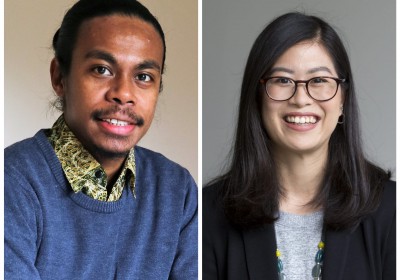Selected Speaker for IDF 2019: Venansius Openg Urge Women to Have the Courage to Make Decisions from the Household Level
November 15, 2019
Venansius Thomas Kapitan Openg, and Sayuri Ichikawa
A selected speaker for IDF 2019, Venansius Thomas Kapitan Openg, along with Sayuri Ichikawa, attempts to identify the ideal approach to address the challenges facing women in establishing their businesses in East Nusa Tenggara (NTT). Through their work entitled Empowering Women’s Small-scale Businesses in East Nusa Tenggara through Platforms to Access a Wider Market, both of them took snapshots and learned from economic empowerment efforts for women groups in which they were assisting at Tasikona Village, Kupang District.
“We reviewed women empowerment in East Nusa Tenggara Province, where the patriarchal system is rigid despite the rapid development of women’s economic empowerment and entrepreneurship,” wrote Venan.
Venan is a Master’s Program student in Applied Anthropology and Participative Development, focusing on communities and environment, at Australian National University (ANU). Venansius had worked as staff for Lentera CIDEC, East Nusa Tenggara, and WADAH Foundation. In IDF 2019, Venansius collaborated with Sayuri Ichikawa from Japan, a Semester II student of the Master’s Program of Environmental Management & Development at Australian National University.
Women Needs to be Courageous in Making Decisions
From the case study of Tasikona Village in his research, Venon mentions two crucial points for women's economic empowerment in NTT. First, starting with increasing the role of women in making decisions.
“Women’s participation in making decisions at the household level must be increased. This increased role for women can have a positive impact in the household, like improved household income,” said Sayuri.
Efforts to encourage women to make decisions are critical, considering that women in NTT tend only to be cast as supporting roles for the decision made by “leaders of households.” In NTT, which follows the patriarchal system, leaders are men. According to Venan, one of the patriarchal model hindering women empowerment in NTT is labeling women as ume, meaning introvert or quiet. This label gives the impression that women are passive. The people then think that a good woman must be submissive.
“Surely we know all about these types of women, who are obedient to their husbands. But we think this can weaken women’s bargaining position in their households,” said Sayuri.
According to Venan, men often use this passive impression for their own benefits, ultimately leading to domestic violence.
“We want to fix this,” he added.
Also, Venan said that strengthening women to be courageous in making decisions at the household level needs to be accompanied by improving education.
“Women must also have access to information and have the freedom to search and find what they want, just like men. We have to change the mindset that differentiates and preserves the gap between men and women,” he added.
Selecting Business Product and Expanding Market
After women have strength by being able to make decisions, the second step in economic empowerment in NTT is by selecting handicrafts as the type of business.
“This is selected because most women in NTT are familiar with woven products. In addition, the community we assisted has implemented this business in the last few years,” continued Sayuri.
According to Venan, this assistance was intended to expand the market of processed woven products, such as wallets, purses, earrings, or shoes.
“We hope to strengthen the economy of the women groups we assisted,” added Venan.
Venan also claimed to receive a myriad of relevant recommendations to expand the market of handicraft products made by women in NTT. He believes that conducting surveys can address market needs and improve business effectiveness.
“For instance, we need to conduct a market survey. This is intended to look at current market trends, what kind of earrings, wallets, or woven products that consumers are interested in,” continued Venan.
The next step is establishing collaboration, for example, opening networks with tour and travel agents in tourism areas, such as Labuan Bajo, NTT, and Denpasar, Bali. A collaboration to expand the market can also use a social intermediary, which is like a market intermediary, but a part of the group. According to Venan, social intermediary plays a significant role in empowering NTT’s women, mainly to sell products to a wider market.
“Individuals or institutions, for example, NGOs, can be social intermediaries, as long as the interest of the group can be prioritised above the individual or institutional interest, and remaining focus to the benefits,” he explained.
Venan conveyed this presentation on women empowerment in NTT in the Ideas and Innovations Marketplace: Co-creating and Collaborating session on the Indonesia Development Forum (IDF) 2019, July 22. Venan and Sayuri developed an idea in Subtheme 6 of IDF 2019, Fostering Social Enterprises. This subtheme discussed examples of successful social enterprises, especially those that contribute to providing employment solutions in remote and marginalised regions, particularly in NTT as the first pilot province in IDF 2019. Subtheme 6 is a part of the main theme of IDF 2019: “Mission Possible: Seizing the Opportunities for Future Work to Drive Inclusive Growth.”
Indonesia’s Research Institutions Supporting the Development of the Electric Vehicle Industry
Indonesian Muslim Fashion and Cosmetics IKMs Shine at Dubai World Expo 2020
Govt Steps Up UMKM Transformation Efforts in the Midst of Pandemic Slowdown
Govt Encourages Promotion of IKM Products in Digital Era
Government Begins Developing Maritime Training Center in Makassar
Tweets by IDDevForum
